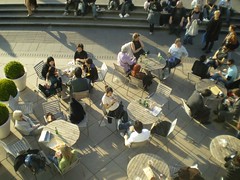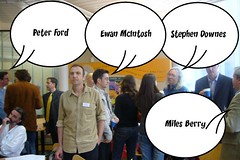16 August 02011
The Whys and Wherefores of Creativity and Sharing: Review of Making is Connecting
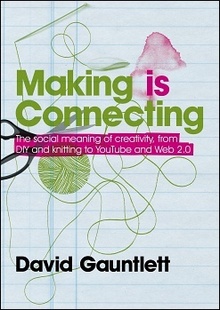 One of the beauties of David Gauntlett's Making is Connecting
One of the beauties of David Gauntlett's Making is Connecting is the way it develops a fundamentally simple idea with successive layers of richness and power. The cover captures the kernel of the book: the core thesis that making (with hands and brain, resourcefully) is connecting (in terms of relationships, meaning, learning); the context that extends from scissors and thread to YouTube; and the ethos of the personal, handmade artefact captured in the stylish smudge that subverts the sleek sans-serif typeface.
One of the perils of writing anything related to Web 2.0 over the last four years is being painted into a corner opposite Andrew Keen and his Cult of the Amateur broadside against the threats to the hieratic hierarchy of professional power. In this case I think the comparison is justified, because Making is Connecting is everything that The Cult of the Amateur was not. Where Keen reductively polarises and thins out the issues he addresses, Gauntlett's treatment is embodied, his points rounded out with substance and complexity. Where Keen uses "amateur" as term of haughty derision, Gauntlett gives us back a fleshed out sense of the word, capturing the care and dedication that come when people make things for love, not money.
Regular readers of this blog with good memories may remember that David Gauntlett is a friend of mine. I interviewed him a year ago when he was writing Making is Connecting. (On the same morning, as well as interviewing me for this blog, David also interviewed me about my blogging on another site for his book — you may be thinking I only review books I've been interviewed for, but I promise that's not true.)
In that 2010 interview, I complimented David on his plain speaking style and how he makes his ideas accessible. That holds true throughout Making is Connecting: it's rare for a book to cite Adorno and Horkheimer while still remaining readable, but this one does. Of Ivan Illich — one of David Gauntlett's guiding lights, along with the likes of William Morris, John Ruskin and Richard Sennett — he says "his writing feels earthy, and engaged with real things." The same could be said of David himself, and I confess I envy him in this.
Continue reading "The Whys and Wherefores of Creativity and Sharing: Review of Making is Connecting"21 August 02009
Progressive austerity and self-organised learning
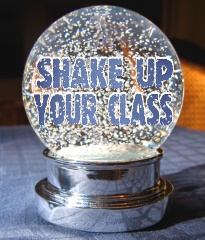
A month or so ago, my friend Guy, whose children are educated at home, treated me to one his occasional rants. "People know there's an Arms Lobby," he said, "so they're very wary about calls for more spending on Defence and question whose interests these serve. But there's an Education Lobby too, and it always wants more spent on educational initiatives and new technologies. Because it frames its proposals as Public Goods," he went on, "middle-class liberals find it harder to see through this hucksterism."
I don't think Guy was having a go at me specifically — I neither support nor participate in any formal lobbying activities in education. But I couldn't escape the fact that a good slice of my consulting income comes from public funding for educational initiatives and new technologies.
And there's no escaping the fact that that funding will not be sustained in coming years as it has been for the last decade. Earlier this year I did some work for the Learning and Skills Improvement Service. Via Seb Schmoller comes a quote from the head of a think tank under the heading of Progressive Austerity, "Any agency with the word 'improvement' in its title could probably disappear without discernible negative effects." Hmmm.
We're all programmed to learn
We all need to take responsibility for finding ways to do more with less. I'm with Guy and many in the growing Collapsonomics wing in thinking that the silver lining to this particular cloud may be not just quite substantial but also very necessary.
Continue reading "Progressive austerity and self-organised learning"7 July 02009
Round-up of talk and interviews
In a brisk (?!) follow-up to my last blog entry, I did a talk to teenagers from three Sheffield schools on the subject "Big Brother is Logging You", sharing the platform with Dave Pattern, Library Systems Manager at University of Huddersfield, who also featured in the TILE libraries event. This was part of the Sheffield 14-19 Diplomas initiative. It was also an experiment in speaking to one physical audience and two 'virtual' ones via videolink, with the occasionally sub-optimal results you might expect with remote teenagers. Both my and Dave's presentations are available online, as Powerpoint, Word supporting materials, and Quicktime video of each section of our talks (unfortunately not embeddable, as far as I can see).
Bringing things almost bang up to date, I was at the Reboot Britain yesterday, and recorded a couple of short interviews with Steve Lawson on AudioBoo. In the first one I revisit and update one of my old, old hobby horses, scepticism in the face of hype about games in learning. Then another old chestnut, mentioning how what Tony Ageh said yesterday about opening up the BBC Archives reminded me of similar proposals made almost five years ago.
Later Steve got me together with Stan Stalnaker of Hub Culture for a discussion. I'd literally only heard of Hub Culture three minutes before the discussion began, so you can hear me trying to work out whether this is an up-market managed workspace or an invitation-only business network, or some combination of the two. Even after hearing Stan speak later in the day, I wasn't entirely clear. Steve was kind enough to tweet my off-the-record explanation for why I didn't answer his second question.
There are plenty more Reboot Britain audio interviews, along with social media of all flavours.
Continue reading "Round-up of talk and interviews"6 February 02009
Applying the lessons of Last.fm to libraries and learning
![]() If fans can discover interesting new music by comparing their listening profiles with those of people with similar tastes, why not apply similar principles to students' discovery of books as they explore how to get the most from university libraries. I have an article in the Association of Learning Technology's current newsletter. It's based around a day of talks about the TILE Project (that's Towards Implementation of Library 2.0 & the e-Framework, in case you couldn't guess), and it starts like this:
If fans can discover interesting new music by comparing their listening profiles with those of people with similar tastes, why not apply similar principles to students' discovery of books as they explore how to get the most from university libraries. I have an article in the Association of Learning Technology's current newsletter. It's based around a day of talks about the TILE Project (that's Towards Implementation of Library 2.0 & the e-Framework, in case you couldn't guess), and it starts like this:
"You looked at The Complete Essays by Montaigne; you might also consider The Renaissance in Europe: A Reader edited by Whitlock." Most of us are familiar with Amazon’s gently pushy way of suggesting further purchases. If you're a music fan, you may have tried “scrobbling” each song you listen to into the massive Last.fm database of listener behaviour. In return for this gift of your data, you get to explore the habits of others who share some of your tastes, and you get a series of recommendations for other music you might enjoy.
Then it goes on like this. It's kind of surprising that these methods are now fairly well established in retail and entertainment, but not in learning. Perhaps that's because educational institutions remain wary of the ways of informal learning, as though such social propagation of ideas were somehow an unruly and untutored threat (it's not).
This may be starting in university libraries, but my hunch is that it's going to spread through all large-scale learning provision over the next decade. I wonder whether this on learndirect's corporate radar (I'm sure some individuals there will have been thinking seriously about it already).
30 November 02008
Social media old and new: two contrasting networks
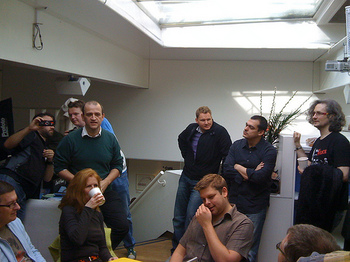 It's a year since I did a 'compare and contrast' blog post about two initiatives to build networking activity. To recap briefly, the RSA is a 254-year-old membership organisation devoted to art, design, business and the environment, currently with around 28,000 'fellows', which launched a Networks initiative on 22 November 02007 (I didn't go). The Social Media Café (a.k.a. Tuttle Club, named after Harry Tuttle), on the other hand, had its very first meeting on 21 November last year, and I did go. It aims to create spaces where people interested in social media can connect, socially and for business. So far, that has involved a series of weekly café sessions, which are 'prototypes' for something that may be more far-reaching. (The picture on the right shows, Lloyd Davis, Tuttle Club prime mover, making a brief announcement at the first birthday meeting nine days ago.)
It's a year since I did a 'compare and contrast' blog post about two initiatives to build networking activity. To recap briefly, the RSA is a 254-year-old membership organisation devoted to art, design, business and the environment, currently with around 28,000 'fellows', which launched a Networks initiative on 22 November 02007 (I didn't go). The Social Media Café (a.k.a. Tuttle Club, named after Harry Tuttle), on the other hand, had its very first meeting on 21 November last year, and I did go. It aims to create spaces where people interested in social media can connect, socially and for business. So far, that has involved a series of weekly café sessions, which are 'prototypes' for something that may be more far-reaching. (The picture on the right shows, Lloyd Davis, Tuttle Club prime mover, making a brief announcement at the first birthday meeting nine days ago.)
One year on, how are they each doing? Where do they converge and diverge?
Let me see if I can build up some dramatic tension here, to make it into a good story. Is the Tuttle Club the 21st century analogue of coffee house meetings that led to the formation of the RSA in 01754? Will the RSA be shown up as a lumbering beast of the 18th century, unable to move quickly or be flexible because of all its baggage, so that the Tuttlers can run rings round it? Or will the Tuttle Club turn out to be a typical Web 2.0 phenomenon, supported by an initial wave of enthusiasm and attention but zero revenue, and at risk from the capricious mood of its freelance participants, who will lose interest when stronger commitments are required of them, or when they (errr, we) finally have to resort to getting proper jobs?
Continue reading "Social media old and new: two contrasting networks "3 January 02008
Looking for examples of social networking for professional development
I'm copying here something I've just added to the OpenRSA blog, relating to some work I'm doing in collaboration with Seb Schmoller:
I'm looking for examples of organisations (or looser affiliations of individuals) who are using social software for professional development. Does anyone have any suggestions that I could follow up?
By social software I mean social networks (e.g. Facebook, Ning), blogs, wikis, shared bookmarks etc. And professional development can mean many things, but I'm mostly interesting in enhancing intrinsic job-specific skills on the one hand and broader scouting of collaborative/entrepreneurial opportunities on the other. The organisations could be membership-based, employers, educators or just self-organising networks.
The selfish part of this is that it relates to some work I'm doing for the National College for School Leadership, who are interested in extending the way they use social software with their constituency of school leaders. I'm happy to feed back the lessons from any leads that anyone gives me and share them with readers of this blog. Look forward to hearing from you if you can recommend any suitable examples (with contact details if possible). Our immediate deadline is 18th January, but happy to continue the discussion beyond then…
Any suggestions welcome, either via comments here, or private communication.
2 January 02008
Does the nature of social networks limit their growth?
One idea in John Naughton's 02007 round-up/02008 predictions struck me: that social networks like MySpace and Facebook "are likely to peak because ego-centric social networking is intrinsically limiting: after you've 'befriended' everyone you know, what else is there to do?". He continues,
Next year will see mass outbreaks of a Facebook fatigue, as busy professionals realise they are wasting an hour or more a day on essentially mindless activities. By contrast, activity-based networking sites, such as Flickr.com, will continue to prosper, for the simple reason that they are not self-limiting in the way that ego-centric services are.
On Flickr, as long as you maintain your interest in photography, you will always have more photos you can upload share. On Last.fm, there will always be more music to discover and listen to.
But Naughton's suggestion that there's nothing to do on Facebook and MySpace ignores the role on social networks of people who make it their business to aggregate people, broker new collaborations or create messages that people will want to share. A minority of these are precious: latch onto their coattails and you will get good introductions to fascinating people. The majority are poisonous: once they have your details they will besiege you with all kinds of message and pokes that are either tiresomely self-promotional or bemusingly random.
The sad fact is that it's the bores that drive the most visible and aggressive growth in activity, so the likes of MySpace and Facebook tend to encourage them. But fast growth leads to fast fatigue. We might all be better off if the social networks would nurture the gold dust few who do networking really well.
23 November 02007
More on building networks
It was about 15 years ago, as I was planning my escape from my job in the civil service, that I became interested in the activity of networking — both personal networking (as a way of finding new work opportunities) and the creation of networks that make links between (rather than within) organisations. Over those 15 years, there's no way I could count the number of networking initiatives (online and offline) that I've taken part in. Over a hundred, for sure. In some cases you can tell right off that the venture will last only a few months and then wither away; in others it's much harder to predict. Often it doesn't matter: longevity isn't everything, and I enjoy the simple spirit of experimentation — "let's try this out and see if it we can make it work this way" — that imbues many of the most unusual networks.
Are the best networks built from scratch on greenfield land or is it better to work within an existing organisation and layer networking on top of some shared history? I'll spare you the suspense of building towards a conclusion by saying that I think both are valid, there are pros and cons of either approach, and "it depends" on the specific context. Having got that out of the way, here are a couple of contrasting examples from recent experience.
Continue reading "More on building networks"3 October 02007
On networking events: broadcasting information or building relationships?
Networking events are everywhere and all the time these days. Especially in metropolitan centres like London. They come in all shapes and sizes, too. Yesterday I attended two, almost back to back, which showed very different expectations and architectures — if that's not too pompous a word — for what makes good networking, and how to facilitate it.
Continue reading "On networking events: broadcasting information or building relationships?"25 September 02007
Net, Blogs and Rock'n'Roll is published
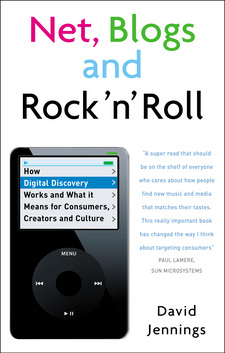 My book is out in the UK. If you buy it from Amazon.co.uk
My book is out in the UK. If you buy it from Amazon.co.uk, you'll make me happy. If you can add to the reviews for the book, you'll make me even happier.
I believe the book is out imminently, if not already, in the US as well — based on the Amazon.com page, where you can also order it.
My book blog has an extract from the book and details of where and when I'm speaking about it.
I hope the absence of recent posts on this site hasn't created the mistaken impression that I've been slacking. I've been using the book blog as my main outlet recently. All my posts there are linked from the sidebar on the home page. If you're using an RSS reader, I recommend my 'compilation' feed, which brings together posts from this site, my book blog and my furl bookmarks related to digital music and digital culture. (This feed uses Yahoo Pipes. It seemed a little unreliable to me at first, but has now settled down: let me know if you have any problems with it.)
13 July 02007
Is Web 2.0 a manifesto for anarchism?
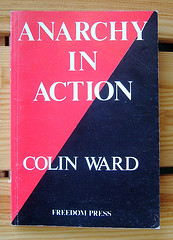 Here are some chapter headings from a book I read on holiday:
Here are some chapter headings from a book I read on holiday:
The Theory of Spontaneous Order
The Dissolution of Leadership
Harmony Through Complexity
Topless Federations
So was it Charles Leadbeater's latest book or Wikinomics: How Mass Collaboration Changes Everything? Nope, it was the book on the left: a 01982 reprint of Colin Ward's Anarchy in Action
, originally published in 01973.
Anarchy in Action is no call to guerilla direct action to undermine the state apparatus. But it was both radical for its time, and prescient. "Anarchists are people who make a social and political philosophy out of the natural and spontaneous tendency of humans to associate together for their mutual benefit," writes Ward near the start of the book. He goes on: "we have to build networks instead of pyramids." So are we all anarchists now, and what does it mean to be an anarchist in the era of Web 2.0? I read this book because I had a hunch that there was a common thread running through old theories and current practice, and I wanted to see how strong this thread might be.
Continue reading "Is Web 2.0 a manifesto for anarchism?"8 May 02007
Give me back my tags: portable attention data
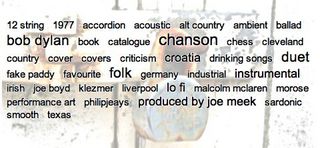 Having recently moved and been caught up in a silly broadband snafu, I spent a couple of weeks without regular Internet access: the previous entry on this blog was composed in the local pub, which offers free wi-fi along with a pint of Youngs bitter. This interrupted form of net access is fine for keeping up with important emails or news on the web. What I missed, though, was the Last.fm tag radio streams that I've built up over the last six months (in fact I missed them more than my CD and LP collection that I still haven't been able to unpack for other reasons).
Having recently moved and been caught up in a silly broadband snafu, I spent a couple of weeks without regular Internet access: the previous entry on this blog was composed in the local pub, which offers free wi-fi along with a pint of Youngs bitter. This interrupted form of net access is fine for keeping up with important emails or news on the web. What I missed, though, was the Last.fm tag radio streams that I've built up over the last six months (in fact I missed them more than my CD and LP collection that I still haven't been able to unpack for other reasons).
Throughout this disturbance I had continuous access to my iTunes library (3,000 tracks — large by some standards, modest by others). Many of the artists and tracks in the library are ones I've tagged on Last.fm, but I don't have access to those tags from within iTunes or without Internet access.
What I really wanted to do was apply my Last.fm tags to the relevant entries in my iTunes library. And my MyStrands tags, while I'm about it. In fact I started tagging with MyStrands first. My tags are still there, but I rarely (if ever) add to them these days, as I realised I was very constrained in getting value out of them. But I tag a lot on Last.fm: I find it a great way of gradually expanding the penumbra of music that I know a bit about, but don't know very well. Firstly, it can be like listening to the radio and using tags to mark the songs you want to come back to, or include in a playlist. Secondly, if I read a review or a story about a band that sounds interesting, I tag them for checking out later.
Continue reading "Give me back my tags: portable attention data"5 January 02007
Of wise and foolish crowds
Kathy Sierra of Creating Passionate Users has written a clear and pithy piece that captures something of the circumstances when crowds are wise and when they're not. I've extracted a couple of her comparisons and put them in table form:
| Collective intelligence | Dumbness of Crowds |
| A pile of people writing Amazon book reviews | A pile of people collaborating on a wiki to collectively author a book |
| Getting input and ideas from many different people and perspectives | Blindly averaging the input of many different people, and expecting a breakthrough. (It's not always the averaging that's the problem it's the blindly part) |
I couldn't have put it better myself (I know that to be true because, in a less clear and pithy way, I tried to). Several of the comments are worth reading too. [Discovered via Jay Cross's Informal Learning blog.]
18 December 02006
Blogs, wikis, 'voice' and accountability
In the course of writing my book, I started by describing blogs and wikis as two examples of the same thing — user-generated content. Towards the end of the book, I came up against the ways in which they are opposites: blogs reinforce individual voices, points of view and attitudes, while wikis efface this individuality and the accountability that comes with it.
Wikis have some advantages over blogs. Their design encourages users to aim for consensus, whereas the design of blogs encourages a kind of Tower-of-Babel cacophony. However, here I'm going to focus on one of the downsides of wikis. This is a philosophical piece that accompanies a more practical article over on my book blog.
Continue reading "Blogs, wikis, 'voice' and accountability"19 November 02006
Just what the world needs: another music wiki
I checked the Alexa traffic ranking for this site last week, and it's down 60% in the last three months… I will be emerging properly from hibernation in a couple of weeks, and livening things up around here.
In the meantime, does anyone know what happened (or is happening) to Napster's Narchive (this link doesn't work for me at the moment, but it used to be the Narchive's address and I can't find one that does)? I mentioned it when it was launched six months ago, as "the people's music archive". I added some comments to one or two entries shortly thereafter, and I noticed the level of activity was low. For a month or more, now, I haven't been able to reach it at all. Have Napster quietly killed it?
Part of the reason I ask is because, I've just come across the Wiki Music Guide, which is in beta (isn't everyone?), and seems to be aiming to occupy a similar space, albeit with a format that's much closer to Wikipedia and also uses MediaWiki software. I added a brief profile of Philip Jeays. Right now, there are fewer than 250 artists on the guide, and those that are there vary between stubs and puff pieces that wouldn't qualify under Wikipedia's neutral-point-of-view criteria.
Continue reading "Just what the world needs: another music wiki"18 September 02006
Wikipedia to bifurcate?
Just last week I was writing (for my book), "No one is going to set up a new free wiki-based online encyclopaedia any time soon: there can be only one." Now I'm considering whether I can edit that to say "No one is going to initiate from scratch a…" or should I just delete it altogether. This in the light of the news that Wikipedia co-founder Larry Sanger is setting up the Citizendium project, which he describes as a "progressive or gradual fork" based on Wikipedia. The difference between this fork and the mothership? Experts have the final say over edits.
There has been some scepticism about Citizendium, but I think it's an interesting and healthy challenge to any dogma of hardline bottom-up evangelists. In the end, the opinions we experience are a mix of expert and amateur, qualified and ad-hoc. Why not try and build that mix into the ecosystem of an encyclopaedia system?
Continue reading "Wikipedia to bifurcate?"3 August 02006
Knowledge, power and mobilising a lobby through Wikipedia
Last night I added my tuppence worth to Wikipedia's entry on the History of Virtual Learning Environments. As manager of an online learning consortium in the late nineties, I helped the software company Fretwell-Downing Education build a pilot web-based Virtual Learning Environment (VLE). Though you would not know it from the entry as it stands at the time of writing, the description I've added of this case study — and the catalogue of others being collected in the Wikipedia entry — are not there just to add to the store of the world's knowledge: they are there to prove a point.
Last week the e-learning systems company Blackboard announced that it had been issued a patent (in the US) covering a number of software features that have been standard components of VLEs for several years. This quickly had several e-learning bloggers up in arms: I found out about it from Jay Cross and Seb Schmoller; and Stephen Downes has a good round-up as usual.
I share the widespread contempt for this development, and the disrepute that it brings on the ethos of patents. That's why I was more than happy to add my contribution to the Wikipedia entry to demonstrate the 'prior art', which could invalidate the patent by showing that the claimed invention was in public use prior to the date of the patent filing. Nevertheless I can't help feeling slightly uneasy about this politically and commercially motivated use of Wikipedia.
Continue reading "Knowledge, power and mobilising a lobby through Wikipedia"23 June 02006
Does blog marketing undermine the credibility it depends on?
Over on my book blog, I had a go recently at defining some characteristics of 'blog culture'. One of those characteristics was the emphasis on the authenticity of the voice you speak with when you're blogging. So, even if you're talking nonsense, you're being yourself, you're not putting on any airs, and there's no ventriloquist with his hand up your back, telling you what to say. (I touched on the same point in a different way, writing about Yahoo, a few months ago.)
But for some professions, that prospect of authenticity is tempting cloak in which to drape some good old promotional messages. I've been reading Connected Marketing: The Viral, Buzz and Word of Mouth Revolution, and I came across this passage in a chapter on blog marketing by Andrew Corcoran and others:
Blog marketing puts credibility back into the marketing mix: In an era where people are increasingly sceptical of traditional interruptive advertising, dismissing overt commercial messages as propAdganda [sic] and corporate spin-wash, blogs represent a refreshing and credible source of information. Readers are more likely to believe information in an opinion-leading third-party blog than in an ad, whilst the informal style of avoiding sales-speak and overt promotion in business blogs enhances the credibility of the medium.Continue reading "Does blog marketing undermine the credibility it depends on?"
4 June 02006
Full versions of articles now available
Last year I posted teasers here about articles I had published on Word of Mouth Marketing and Playlisting and on Remix Culture (the articles were featured in Five Eight and The Spectator respectively).
Their value as 'exclusives' has expired, so I've published the full version of the Word of Mouth piece on my Net, Blogs and Rock'n'Roll blog, and the Remix piece is available as a 64 KB PDF file for download.
3 June 02006
Blogging, learning, and going off at tangents
I start off questioning the value of blogging an event that you know in advance will be blogged to death from every side. Does it really help anyone to have multiple perspectives on one thing, when the inevitable inconsistencies between them may be confusing? And if there are six accounts already, what added value is there in a seventh?
And then the penny drops, and I realise how to answer my question: I'm not doing this just for your benefit, dear reader, I'm doing it for mine. It's a means of consolidating my reflections. I leave them on my doorstep, and if you pass by and find them interesting, so much the better. But I'm under no obligation. Did you think I was aiming to be 'customer-centred'? Pay me some money, become a customer, and I might be. Until then, if there's no value in this for you, well, you can have a refund. For blogs to have an authentic voice, people have to speak first as citizens, not try and fit what they say into customer/supplier roles.
All of which is a lengthy preamble to a few comments I wasn't expecting to make on yesterday's blog.ac.uk conference.
Continue reading "Blogging, learning, and going off at tangents"21 May 02006
A clutch of future-gazing events to plug
First is the b.TWEEN 06 forum of future entertainment, coming at the end of this week (25 and 26 May) in Bradford. The programme covers pioneering cross-platform work that straddles art and commerce. Sadly I can't make it this year, but I enjoed the 02002 event, and aim to be there next year.
I will however be at the one-day Content 2.0 event at the RSA, London, on 6 June. The programme looks interesting, as long as it doesn't descend too much into voodoo-speak and hand-waving about brands. If you'd like to attend, let me know, as I may be able to do a deal (for one person only) on ticket price.
Finally, I may be at the MusicStrands summer school on The Present and Future of Recommender Systems in Bilbao, 12-13 September, which includes participants from MusicStrands, Yahoo! and several universities. Thanks to Paul Lamere for flagging this.
17 May 02006
Behaviour patterns in collecting music and video
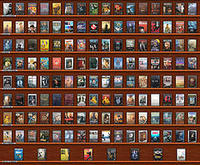 I'm looking at patterns in how people collect different media, and how collecting relates to repeat listening/viewing/using. In the UK, estimates of the average number of CDs in a collection vary between 126 and 178 for men, 135 for women. Are there any similar figures for DVDs or games, or for US markets? I'm still looking.
I'm looking at patterns in how people collect different media, and how collecting relates to repeat listening/viewing/using. In the UK, estimates of the average number of CDs in a collection vary between 126 and 178 for men, 135 for women. Are there any similar figures for DVDs or games, or for US markets? I'm still looking.
I'm also doubtful about whether reliable figures exist for the number of digital downloads in collections. There was a report last year indicating that the average number of tracks on an MP3 player is 375, with 50% of players having fewer than 100 tracks. But this is a fast-moving, unstable area, clouded by allegations that 'most' tracks on players are 'stolen', which can't make it any easier to get reliable reports from users.
Continue reading "Behaviour patterns in collecting music and video"13 May 02006
Book announcement: Net, Blogs and Rock'n'Roll
People have access to vastly more music, video and other entertainment than ten years ago. In the case of music, record companies are releasing twice as many new albums per year. Not only that, but some are 'rescuing' old and deleted tracks for release in the digital marketplace.
So how do people find out about all this material? How do they judge what they might like? I'm writing a book that addresses these questions. The title is Net, Blogs and Rock'n'Roll: Who knows what's next in media and music in the new era of digital discovery and the download culture (the lengthy subtitle may change). It will be published next year by Nicholas Brealey Publishing, UK publishers of John Battelle's The Search and many other titles on digital enterprise and learning.
Continue reading "Book announcement: Net, Blogs and Rock'n'Roll"4 May 02006
Aggregating the non-music stuff about music
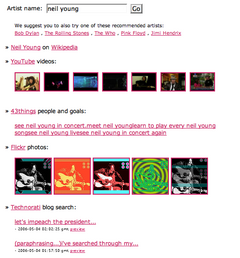 The MusicStrands Labs seem to have a good head of steam at the moment: it's worth keeping an eye on their blog. The recent announcement that caught my eye was their music-related content discovery (we need a better term for this!) mash-up. The thumbnail on the right (click it to enlarge) shows the Wikipedia entry, YouTube videos, Flickr photos, blogs indexed by Technorati, and goals entered on 43things, all relating to Neil Young.
The MusicStrands Labs seem to have a good head of steam at the moment: it's worth keeping an eye on their blog. The recent announcement that caught my eye was their music-related content discovery (we need a better term for this!) mash-up. The thumbnail on the right (click it to enlarge) shows the Wikipedia entry, YouTube videos, Flickr photos, blogs indexed by Technorati, and goals entered on 43things, all relating to Neil Young.
It's a simple but effective application of Web 2.0, and would become even more valuable if and when it could aggregate reviews, interviews and gig listings in your country. All these 'collateral assets' can enhance people's discovery and learning about music. The MusicStrands tool is the closest thing I've seen yet to the outline for social software to enhance personal media collections that I wrote eighteen months ago.
3 May 02006
Spoofing music recommendation services and personalised radio
Music recommendation services and personalised radio stations like Last.FM depend on tracking the behaviour and preferences of their users, and building personal profiles on the basis of this. So what happens if the data you feed into these services isn't a human's preferences, but something else, like the programming of a traditional radio station or the output of another recommendation service?
At the risk of putting 2 and 2 together and making 5, there's another link here with last week's BBC Creative Future announcement. In the music section of the announcement there is a recommendation to "Enable people to create their own virtual radio channels out of the wealth of our existing output, channels reflecting their own personal tastes". That doesn't sound identical to Last.FM — which makes virtual radio channels out of a catalogue of music tracks reflecting users' personal tastes — but it is kind of similar.
Continue reading "Spoofing music recommendation services and personalised radio"25 April 02006
Virtual listening sessions with your buddies
For years it's been common for people posting to music-related email lists and forums to sign-off with a note saying "now playing" (abbreviated to "np") followed by the title of the album they had on while composing the message. It's a way of adding a personal touch, disclosing a bit more of your musical identity, and hoping some of the aura of the music would rub off on you.
Of course, you could always claim you were listening to Trout Mask Replica when you actually had a Carpenters compilation on (I'm not casting aspersions: both have a place in my collection). But if you're listening with iTunes or Windows Media Player, and you have a new feature in MSN Messenger 7.0 enabled, then your buddies will automatically be able to see what's actually playing on your computer.
For me, this would get interesting if you could actually elect to listen to what your buddy is playing: the virtual equivalent of saying, "please can I listen in on one of the earphones on your iPod" or just sitting in the same room playing records and chatting about them. Clearly there are licensing issues with this, but Mercora has a legal solution that allows users to stream music from friends' collections.
What I have in mind is a solution that enables both streamer and streamed-to users being able to listen more or less synchronously, and have a chat via instant messenger at the same time. Does anyone know if this functionality is available anywhere (Mercora is Windows-only, so I can't use it)?
14 April 02006
blog.ac.uk: educational use of weblogs
On 2 June I'll be participating in the blog.ac.uk one-day conference on educational use of weblogs and weblogging software. It's in London at Living Space, and is free to attend. There's an embryonic web site for the event, which will develop over the next six weeks.
My involvement comes through a connection with Josie Fraser, who (along with Steve Warburton) is a fantastic catalyst for bringing together bloggers in the learning area. Register your interest in attending by emailing Josie via her posting about the event
5 April 02006
Music recommendation data spread about
Having written last month about Pandora apparently opening up, and having drawn comparisons with Last.fm, two music services have licensed some of the Last.fm data to add recommendations to their sites.
Download store and magazine site TuneTribe.com is perhaps the less interesting example. Their home page now has a search facility "powered by Last.fm". Provided your search gets an 'exact match', you get a link to recommendations for similar artists. Thus TuneTribe's similar artists for Brian Eno are effectively the same as the Last.fm listings of similar artists for Brian Eno — though interestingly the rankings are slightly different, suggesting that TuneTribe does not have a 'live' data feed. The Last.fm-TuneTribe arrangement is reciprocal in that the Last.fm web site includes links to download tracks from TuneTribe.
Continue reading "Music recommendation data spread about"30 March 02006
Musicube sharing of BBC listening profiles
 Through Radio 1, the BBC has introduced a Flash interface to its on-demand 'listen again' feature, which enables listeners both to personalise the user interface they use to access radio programmes, and to share this interface with their friends. My personal 'musicube' is shown below. The elements I got to specify are the genres included in the 'cube', and the amount of space they take up.
Through Radio 1, the BBC has introduced a Flash interface to its on-demand 'listen again' feature, which enables listeners both to personalise the user interface they use to access radio programmes, and to share this interface with their friends. My personal 'musicube' is shown below. The elements I got to specify are the genres included in the 'cube', and the amount of space they take up.
One blogger has reviewed the musicube as "a cool (if fairly useless) concept". The cool bits are the ease of personalisation, the sharing capability and the eye-candy look. As far as the utility goes, if you're an efficiency-conscious hacker, there are quicker, less pretty ways of building your own console for the BBC's radio programmes.
Continue reading "Musicube sharing of BBC listening profiles"8 March 02006
Is Pandora opening up?
There's an interesting press release about Pandora and Friendster hooking up together to bring a social dimension to Pandora's 'personal radio stations'. (The press release currently appears on Friendster's site, but not on Pandora's — not sure if there's any significance in that.)
Bringing Friendster and Pandora together takes the experience to another level: Friendster Radio expands the universe of music discovery beyond the individual listener to the listener's friends and the entire Friendster Network. Friendster users build radio stations that can be shared, evolve, and even become 'hits' on Friendster.Continue reading "Is Pandora opening up?"
15 January 02006
Peer-to-peer recommendations coming to mobile
Proving that convergence is rapidly becoming a fait accompli, news of personalised radio on mobiles is supplemented by peer-to-peer recommendations on mobile devices, currently in prototype development through the Push!Music project in Gothenburg. The site encourages you to
Imagine that you have a mobile device that can store and play back music files, for example a mobile phone with an MP3 player. As you encounter various people, the devices you are carrying connect to each other wirelessly and media agents from the other nearby devices check the status of your media collection. Based on what you have been listening to in the past and which files you already own, new music might spontaneously and autonomously 'jump' from another device to yours (and vice versa). Later, when you listen to your songs, your Push!Music player also plays some newly obtained tunes that you had not heard before.Continue reading "Peer-to-peer recommendations coming to mobile"
22 December 02005
Research on playlists and sharing as means of recommending music
The transition to online music distribution is occurring at the same time that consumers have an exploding number of sources of information about music, from established media sources to Internet-connected friends and strangers. As a result, getting the word out about new material, new bands or back catalogs is made more difficult for music marketers and artist promoters. Harnessing the instinct of consumers to share music and information about music and the communications tools available will be an important strategic thrust for music labels and distributors.
This comes from a research report about online playlist services by the Berkman Center for Internet and Society. Their twelve-page report — a free download (536 KB PDF file) — is based on a survey of early adopters of digital media.
Continue reading "Research on playlists and sharing as means of recommending music"19 December 02005
MusicStrands: playlist sharing and music discovery
Last week MusicStrands launched a major upgrade that extends its scope by adding new ways to tag, discuss, and discover music — see the overview of the new features. This is moving in the direction of the MySpace music community — technically I think it's a step ahead of MySpace, but clearly lacks the latter's current buzz — so in some ways it's unfair to concentrate just on its playlist sharing features. But that is what I'm going to do here, as I didn't include MusicStrands in my previous reviews of playlist services.
To try out the new MusicStrands, I first created a new Philip Jeays 'imaginary celebrity playlist' (see more about this genre and more about Jeays), then I repeated my Neil Young playlist, to provide a direct comparison with creating the same playlist on other services. More about the details of these below, but first an overview of MusicStrands playlists, using my standard criteria.
Continue reading "MusicStrands: playlist sharing and music discovery"28 November 02005
Does music have a genome?
Alongside the Last.FM model of personalised online radio (which I covered at some length and have cited in several other posts), Pandora provides an alternative based on different technology and classifications:
We take your input (artists, songs) and feedback ("I like this", "I don't like this") and use the Music Genome Project™ to create stations that play songs that are musically similar to what you've told us. That's it; only the music counts. We don't care how popular the artist is, who's backing them, and we don't care which genre bin they usually belong in. Only the music matters. [Source]Continue reading "Does music have a genome?"
15 November 02005
Use case examples of Web 2.0
"This article may be confusing for some readers, and should be edited to enhance clarity." That's the editorial foreword at the top of Wikipedia's entry for Web 2.0, an entry which says straight off, "a consensus upon [the term's] exact meaning has not yet been reached" (all quotes as of the time of writing, but subject to change). I discovered, after I started writing this post, that searches for Web 2.0 were briefly in the top ten searches on Technorati's blog index, so bloggers at least are keen to know more. I found all of that strangely reassuring, because it meant that it's not just my lack of brainpower that's to blame for me not being able to get a firm handle on the concept.
But a presentation at this week's User-Generated Content seminar from Colin Donald of Futurescape gave me some more insight through reasonably concrete examples — the kind of use cases that I was missing when I wrote about Digital Lifestyle Aggregation (a very Web 2.0 technology).
Continue reading "Use case examples of Web 2.0"20 October 02005
Sharing book recommendations
Based on my reading this year, I've added some more book recommendations to the Stuff We Like web site. This community site shares the tag-based 'folksonomy' approach of flickr and del.icio.us. It also shares the links to online retailers of some music playlisting services like Soundflavor or UpTo11.net — though Stuff We Like is not-for-profit and any commissions go to beneficiaries.
Continue reading "Sharing book recommendations"29 September 02005
Stealth P2P research and its limitations
As the major-label record industry seems to be getting increasingly confident about pressuring peer-to-peer (P2P) music services to get into line, there is more open discussion about analysing P2P use as a source of marketing intelligence that can be used to grow sales. But by focusing exclusively on quantitative data obtained by stealth, the industry is still playing with one hand tied behind its back, denying itself the possibility of getting a richer understanding of what the figures really mean in terms of listener behaviour.
Continue reading "Stealth P2P research and its limitations"11 August 02005
Bigmouth Strikes Again — Five Eight article
My article on word-of-mouth recommendations among music fans and playlist sharing is the cover feature in the August issue of Five Eight music business magazine. Here's the introduction (written by Five Eight editor, Eamonn Forde):
Word of mouth is a term passed around the marketing playground everyday. But in a culture where the marketplace is increasingly connected, it is time to ask how these powerful and very personal phenomena can be understood and exploited. Word of mouth springs from communities — increasingly more powerful because of online and mobile — where trust is key. How can the music industry effectively work in and, crucially, with these communities and build a relationship of trust and effective recommendation systems, particularly through playlisting?
To read the full article, you need to subscribe to Five Eight.
Continue reading "Bigmouth Strikes Again — Five Eight article"3 August 02005
Aggregation of data across social networks
A few days ago Marc Canter sketched the idea of a technology to interconnect social networks together, via a post on the Pho list, and it caught my eye. "Instead of a giant centralized social network with 1,000,000 members, we'd prefer to see 1,000,000 social nets with 10-25-150 members each", he wrote, referencing work done by his company Broadband Mechanics.
That got me thinking, and this posting is an attempt to capture some of the thoughts triggered by that vision — even if some of them are tangential to what Marc is trying to build.
Continue reading "Aggregation of data across social networks"26 July 02005
Jotspot wiki for e-learning guidance
Wikis are great for supporting long-term or large-scale collaborative projects, enabling multiple team members to edit the same document, with the scope to view or 'roll back to' older versions. But for smaller projects the 'entry cost' of configuring them correctly and getting your material into wiki format, which is not standard HTML, can be a barrier to using them (I touched on this tangentially in last year's posting on building a wiki). Jotspot offers an alternative way in to building wikis, using MS Word-style WYSIWYG editing, and a straightforward way of importing content from standard file formats like Word and Excel. It also has a valuable set of applications that you can plug into your wiki to add functions, from project management and tracking to forums and polls.
As part of my work for the TUC, I used Jotspot to create an online version of guidance about managing TUC e-learning. This was initially produced and edited in Word, but, once we reached 'version 1.0', we wanted to have a means for the document to be shared by all potential users — meaning that they could update it in the light of experience, and everyone would always be able to find the latest version.
Continue reading "Jotspot wiki for e-learning guidance"16 May 02005
Bootstrap Network/interview with me
I met Graham Stewart a few months ago in connection with some online social networking developments. Graham's very active in building, and experimenting with, social software. His latest endeavour (with Neil McEvoy) is the Bootstrap Network, a "self-organising community of Internet entrepreneurs seeking to collaborate and create new business ventures". (For geeks, the Bootstrap Network, like Ecademy, is written in Drupal.)
Graham recorded an interview with me, posted in his Bootstrap Network blog, which covers some thoughts on online learning, and on music-related learning resources with particular reference to podcasting. The interview was done over the phone, so please excuse some of the awkward pauses and less-than-articulate mumblings.
12 May 02005
BBC geek archive (sort of)
One news service to which I subscribe described the backstage.bbc.co.uk beta as "the talked-about BBC content archive", which confuses it with the pilot of the Creative Archive, which it isn't. But it's easy to see how this confusion arises. The backstage site headline (at the time of writing) is "Build what you want using BBC content", which is pretty close to one of the stated purposes of the Creative Archive.
backstage.bbc.co.uk is targeted more at techies than at 'creative media' producers — a distinction that is becoming increasingly blurred. The content that it offers is not programmes but a collection of RSS feeds and APIs (RSS definition, API definition). A software development kit is also promised in the near future. This content and data isn't licensed under the Creative Archive Licence but under some terms of use that have a remarkably similar gist to the CA Licence.
Continue reading "BBC geek archive (sort of)"6 May 02005
Recommendations for enhancing iTunes' sharing features
Since my posting on research into iTunes music sharing, I've got a copy of the full paper and found time to read it on a recent train journey. Last time I focused on how people manage the impressions that others get from their music collections, but the research also has interesting things to say about unanticipated uses of iTunes sharing, and implications for enhancing the sharing features.
The paper — by Amy Voida and four co-writers — points out how iTunes differs from the large-scale peer-to-peer applications (like the original Napster, KaZaA etc), which tended to anonymise music sharing. With the latter, a user downloading a track will typically have no interaction with the person who made it available for sharing. With iTunes, sharing is restricted to people on the same subnet, which often means the users know each other personally off-line. In the 175-employee organisation where the research took place, there were four different subnets, three of which were restricted to single floors in a building. This significantly alters the nature and dynamics of the sharing. For example, where the big peer-to-peer applications require thousands of users before they reach critical mass or tipping point, this research suggests that iTunes sharing can be viable and valued with just two users — in circumstances where they also share experiences and understandings in other parts of their lives.
All the research findings reflect different ways in which technical, musical and organisational factors (or, as the researchers call them, "topologies") are overlaid and interact with each other.
Continue reading "Recommendations for enhancing iTunes' sharing features"2 May 02005
Freesound project: Flickr for sound samples
The freesound project enables people to share sound samples under a 'sampling plus' Creative Commons licence.
The site is clearly heavily indebted to Flickr, which has set the standard for sharing and community facilities for photographs. You can see this in freesound's approach to tags (cf. Flickr tags), comments and forums. One difference is that Flickr allows a broader range of Creative Commons licences, as well as the traditional 'all rights reserved' copyright.
At the time of writing, fewer than seventy people have added sound files to freesound. I've uploaded the two recordings I did for a sonic art course eighteen months ago. One of the smart things about freesound is that, as well as browsing by tags, you can also browse other samples that sound similar to a particular sample. So, from my recording of a Thameslink train journey, you can get a list of similar sounds, which include some 'literally' similar sources (an announcement at a Malaysian airport, a train coming into a Barcelona metro station) and some more laterally connected (oriental sliding strings). A valuable resource for anyone interested in making sound art or mash-ups.
6 April 02005
Researching how communities share music via iTunes
This research paper on patterns of sharing iTunes music in an office, presented at the CHI (originally Computer-Human Interaction) conference yesterday, is the other side of the coin from the personal-stereo research I reviewed in my last posting.
Where that research was about using music to reclaim public space as private space, this paper is about how people project and present their identities in social settings, through their music collection. Where I was disappointed that the personal-stereo research had little to say about the music itself, this research is very much concerned with the choices people make between different musical selections, and how they relate to their personal collections. As the press release puts it,
Employees in a mid-sized U.S. company reported that they consciously worked to portray themselves in certain ways through the collections of music they shared with co-workers, some of whom they barely knew. Sometimes their self-portrayals were misread by co-workers with different musical interests and knowledge. Nevertheless, music sharing served to build a community within the workplace.Continue reading "Researching how communities share music via iTunes"
13 February 02005
Online Social Networks Conference (feeling overloaded)
I'm currently taking part in Online Social Networks 2005, and online conference that runs until 23 February — as the web site says, "It's not to late to register". It's organised by leading evangelists for online networking, Howard Rheingold, Lisa Kimball, and Joi Ito. Most of the proceedings are available only to people who have registered, but Joi Ito has posted an openly accessible mp3 of the opening keynote session via his blog.
It's been a long time since I participated in one of these events — the last one being Collaborate 98, produced by some of the same team, which now has its proceedings openly available for browsing online. I think the price has dropped significantly in the last seven years (Online Social Networks 2005 is $35 to register, which is just under £20).
The conference is just starting up before more focused business gets under way next week. But already I'm finding it hard to keep up with the many voices. Online networks used to be smaller and less Babel-like than this.
Continue reading "Online Social Networks Conference (feeling overloaded)"11 February 02005
Shadowy music promotion in online social networks
A couple of months ago, I wrote about record labels using online social networks to promote their artists. The current issue of Music Week has a feature on this. Says the article,
Most web PRs now reject the shadowy practices of the past, when online marketeers could frequently be found taking advantage of the anonymity of the medium to sow their recommendations in chatrooms. "Having been at the frontline of that, way back when I started out, I am not really convinced of its merits," says [MD of Hyperlaunch, Don] Jenkins. "There is something a bit piss-poor about the notion of people from marketing companies posing as other people."
However, some PR agencies still inhabit the shadows, as demonstrated by this exposé of a large number of identical messages on several online forums that aimed to head off the ridicule being heaped on Ashlee Simpson (a singer, apparently) after she was booed at a broadcast performance. A dumb own goal. And an American PR agency has recently been posting job ads saying "We are looking to hire 30 Online Marketing Ambassadors to Chat and Write Message Board Messages. Multiple Shifts available…"
6 February 02005
The politics of location-based technologies
Attending the PLAN network last week, the biggest surprise for me — given that PLAN is an arts organisation — was how many of the speakers focused on macro issues of policy, regulation and infrastructure.
This emphasis led me to search out Jonathan Grudin's prescient paper from fifteen years ago, The Computer Reaches Out: the Historical Continuity of Interface Design (download as 1.1 MB PDF file). In it, Grudin charted how the focus of the 'interface' in computing extended — over the period from the 1950s to the early 90s — from the hardware, to software, through the screen, to groups and organisations. He argued that, with this shift, the duration of the events studied to design the interface increased from microseconds to days, and the methods used to study them changed from ad hoc techniques, through lab experiment, to ethnographic observation. (For a concise overview of these trends, see Figure 1 and Table 1 in Grudin's paper.) With the era of ubiquitous computing ('ubicomp'), one could argue that the computer has reached out once more: the interface is at the level of society and the public domain; the events studied develop over months and years; the methodology is historical and political analysis. Here are some examples from the PLAN event.
Continue reading "The politics of location-based technologies"20 January 02005
Art applications of ubiquitous computing
The combination of wireless communications and miniaturisation of devices, from mobile phones to RFID tags, opens up a rich seam of new technology applications that do not depend so exclusively on screens for interaction with people. In some cases the user interface can be embedded in physical objects that are aware of their location in space. Howard Rheingold's book Smart Mobs was among the first to raise awareness of the potential for new services that give a new twist social and physical spaces.
At the start of February the two-day PLAN Workshop at London's ICA features a lot of research on applications of the new technologies in the arts: dance, sound, installations and new media. It may be conservative of me to say so, but I feel this area needs a better vocabulary to communicate to a wider audience: for a start, the word 'locative' has an established meaning, different from one that the PLAN people seem to give it.
Continue reading "Art applications of ubiquitous computing"23 December 02004
Using social spaces to seed sales
Interesting to see how this Guardian report of a record label recruiting school-children to help promote its artists in schools (requires free registration) led almost immediately to the label, Universal, suspending its scheme. Clearly it crossed some taboos about commercial and possibly cynical 'exploitation' of children, even though the children were clearly happy participants.
This practice is common outside schools, where labels refer to their under-cover promoters as 'street teams'. The 'street' is also moving online, according to this report from CNET. Universal probably got caught out by the blatant physical presence of posters on school boards and children giving presentations in class. The children apparently had to prepare 'school reports' to evidence their activity. By comparison, the idea that children might discuss their favourite music in online forums and chats is likely to feel less sinister, less obtrusive, as well as being easier to evidence. It seems a fair bet that some labels are still doing that now.
Continue reading "Using social spaces to seed sales"9 November 02004
Outline for social software to enhance personal media collections
I had an idea today for a bit of software and/or web-based service that would combine the features of cataloguing all your personal media collection (CD, DVD, digital files of various formats) and linking each item to the commentary (reviews, interviews, fan comments) that may enrich your experience of the song, album or film. This would combine the database functions of software like Media Catalog Studio with the facilities for sharing and 'social tagging' of resources offered by del.icio.us and Flickr.
It would enable you to compile your own 'boxed set' for your favourite albums, artists and films: the core media content that you've acquired through normal retail channels, plus the 'extras' that you and others have compiled to go with it.
Continue reading "Outline for social software to enhance personal media collections"1 November 02004
New DJ Alchemi bookmarks and feeds
As promised three weeks ago, I've now added several links to my archive of bookmarks, which stands at 185 entries so far, from the home page. The seven most recent bookmarks are displayed as well.
Since I'm tracking a developments in digital music a lot at the moment, I've included a direct link to this largest category of bookmarks. But you can access any of the categories by adding the category name to the URL http://www.furl.net/members/davidjennings/, so for my e-learning bookmarks can be found at http://www.furl.net/members/davidjennings/e-learning, and so on.
If you use any news aggregator software or service, you can get these bookmarks at aggregate or category level using the RSS feeds.
For more details on the workings and implications of Furl and other approaches to 'social bookmarking, see this recent article by Brian Lamb, who's making similar use of the Furl service.
18 October 02004
Article on the evolution of social software
Christopher Allan's Life with Alacrity blog has an amazing article Tracing the Evolution of Social Software, which manages to be both comprehensive and concise in covering almost fifty years of people using software for organising themselves collaboratively.
Allan covers all the key visionary figures, including Doug Englebart and the Johnson-Lenz's. I saw the latter give a talk ten years ago, and their perspective of group awareness and conflict resolution through software definitely put them at the hippie end of the Californian ideology (which was actually quite refreshing since they were speaking as guests of the DTI).
Allan's article focuses mostly on the evolution of terminology. If I have one criticism, it is that it misses out on the shift from local networking and community bulletin boards to the social entropy of the Internet in the 1990s. From my perspective this growth of the Internet worldwide had a major effect on the kind of social organising that was possible and realistic.
10 October 02004
FURL: creating and sharing better bookmarks
I came across the FURL site (short for File URLs) because someone has linked to one of my postings about wikis from there — see the interesting collection of wiki-related sites for an example of how FURL works. The site is a useful tool for extending the scope of bookmarking web pages, and because you can share your bookmarks it also provides a useful complement to a blog site.
Self-style 'usability guru' Jakob Nielsen pointed out that browsers need better bookmark management in the middle of the last decade. More recently, he has observed that "Web browsers' despicably weak support for bookmarks/favorites has contributed to the decline in users' interest in building a list of favorite sites". FURL helps address this.
I plan to use my FURL archive as a store for online resources that I may or may not write commentaries on here on this site. I'll add it to the links from the home page in a bit, but right now there's hardly anything there.
30 August 02004
Building a wiki learning resource
Over the last month I've built a web site that allows me to test out a few ideas about collaborative and 're-mixable' learning resources. And to indulge a passion for The Magnetic Fields' 69 Love Songs, my favourite album.
69 Love Songs information is a 'wiki' site. I've touched on wikis briefly before. The technology — which allows many people to edit the content of web pages without knowledge of HTML or restricted logins etc — has been around for several years, though its adoption has remained most enthusiastic with the technical community. I have found one other wiki site devoted to a cultural artefact or artist — a sophisticated site for They Might Be Giants with over 70 contributors — if you know of others, please let me know.
The rest of this posting covers how the site is built and develops, what its potential for learning might be, and the limitations that I have either hit already or expect to hit.
Continue reading "Building a wiki learning resource"28 July 02004
Preliminary sketch for online music listener research
What kind of data do you need to cut a swathe through all the commentators and tell you whether music download services are really going to spell the end of the album? Or whether on-demand features will change the relationship between listening to new music and owning it?
Notching up each extra zero on the end of the iTunes Music Store sales figures only gives you an impression of aggregate growth of this particular kind of service, the rate of growth, and market share relative to comparable services. This data will tell you that, in the next few years, more people are going to be downloading music, and the relative success of different services will wax and wane — which is not news really.
So I did some no-budget research and collected some data, based on the Last.FM service, the results of which ask more questions than they answer, but this process clarifies what further data would be useful.
Continue reading "Preliminary sketch for online music listener research"7 June 02004
Wikis and learning
I don't fully understand the technology that underpins what a wiki is and this article on educational wikis doesn't fully enlighten me. But it doesn't assume any knowledge, and is reasonably concise.
It's important to remember that the web as we know it provides only a limited subset of the features that were envisaged and developed for early hypertext systems. Wikis, like blogs, provide a means to manage the content of web pages without needing detailed web authoring knowledge. The unique feature of wikis appears to be their support for collaborative authoring.
Continue reading "Wikis and learning"28 April 02004
Mobile information appliances for museums
Earlier this month, the UK's National Endowment for Science, Technology and the Arts (NESTA) announced its support for a project to develop hand-held, touch-screen, wireless computers that will 'offer a host of relevant information including text, video, pictures and sound' when pointed at a museum exhibit.
The breathless stream-of-buzzwords tone is probably just par for the course in press releases, which invariably concentrate on technological fetishism rather than boring old human behaviour. This project is interesting for showing what's technologically possible; but it's unclear how much attention will be given to the ways in which people's habitual and preferred behaviour in the social space of a museum will affect use of the technology.
Continue reading "Mobile information appliances for museums"17 February 02004
Online Business Networking
After six months developing this site, I can tell I'm not a natural 'blogger.' I find it difficult to write in 'bite size' chunks: if I'm going to cover something, I want to do the 'full meal' and say all the things I have to say about the topic.
So, I'm at my most bloggish when short of time, as now when — instead of the full essay on social software that I mentioned previously — I only have time to provide a quick link to the Online Business Networking site, which provides a review guide to a range of sites for...you guessed it: online business networking. Their review of Ecademy is accurate and comprehensive as far as my experience goes. The site also contains a good blog section, and a promo for the authors' book about… you know.
4 February 02004
Social software and venture capital
I'm considering doing a proper review posting on 'social software' at some point — sites like Ryze, LinkedIn, Friendster, and the one I use, Ecademy, which provide means to broaden your network of contacts. But in the meantime, I recommend the admirably cynical comments of Venture Capitalist Jon Staenberg on the sector.
Sample quotes: "Let's not fool ourselves, sex still is the motivator and most of the activity around these sites is still around dating"; "I am on every service. I get almost no value from the services and in fact am starting to find them annoying as more and more random people are asking me to meet Bill Gates..."

Subscribe to my RSS feed, which covers this blog, my book blog, and further commentary on other web resources (more feeds below)
Progressive austerity and self-organised learning
Round-up of talk and interviews
Applying the lessons of Last.fm to libraries and learning
Social media old and new: two contrasting networks
Looking for examples of social networking for professional development
Does the nature of social networks limit their growth?
More on building networks
On networking events: broadcasting information or building relationships?
Net, Blogs and Rock'n'Roll is published
Is Web 2.0 a manifesto for anarchism?
Give me back my tags: portable attention data
Of wise and foolish crowds
Blogs, wikis, 'voice' and accountability
Just what the world needs: another music wiki
Cinema (24)
Cultural Calendar (86)
Curatorial (66)
E-learning (102)
Events (35)
Future of Music (95)
Human-Computer Interaction (62)
Ideas and Essays (37)
Long Now (18)
Miscellany (44)
Music and Multimedia (157)
Playlists (27)
Podcasting (12)
Politics (12)
Radio (48)
Reviews (58)
Social Software (60)
Teaching (23)
Alternatively, see the Date-based Archives
Recommended: RSS feed that combines items on this site, my book blog, and commentary on other web resources
RSS feed for this site only
RSS feed for my book, Net, Blogs and Rock'n'Roll
RSS feed for shared bookmarks
My latest bookmarks (click 'read more' for commentary):
My archived bookmarks (02004-02008)
On most social sites I am either 'davidjennings' or 'djalchemi', for example: Flickr, Last.fm, Ma.gnolia and so on…
Lateral Action — managing creativity
Herd — social cognition
Seb Schmoller's e-learning mailings
Viridian Design Movement
Tom Phillips — artist
Long Now blog — resources for long-term thinking
Longplayer live stream — 1,000-year composition

The contents of this site are licensed under a Creative Commons Licence except where otherwise notified.
Hosted by Paul Makepeace
W3C Standards
Check whether this page is valid XHTML 1.0
Check whether the CSS (style sheet) is valid

